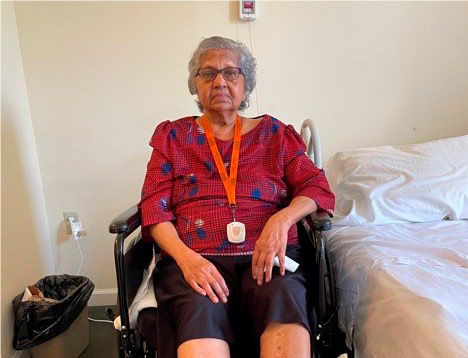Reactivation Care Centre: Restoring patients’ health on their journey home

North York General Hospital’s (NYGH) Reactivation Care Centre (RCC) is a collaborative care model that is designed for patients who no longer require hospital care but need restorative care to support their transition home or to another setting, like long-term care. Currently, North York General’s RCC is located at Humber Finch Hospital Finch site but will soon relocate to a new space in the East Tower of the current Branson site.
“Supported by a substantial Ministry of Health capital investment, the revitalized RCC will offer a safe, comfortable and pleasant environment for more patients and families in our diverse community,” says Rudy Dahdal, NYGH’s VP, Planning, Redevelopment and Clinical Support.
“The RCC is an important option for seniors and others who need additional support,” says Zahra Ismail, NYGH’s Program Director, Transitional Care and Community Integration. “Specifically, the RCC team provides rehabilitation and recreational care activities tailored to each individual and works with the patient and their family on a plan to safely transition the patient to the next level of care. These enhancements will help our diverse population now and for years to come.”
The revitalized RCC will offer twice the number of beds compared to the existing space – growing from the current 32 to 60 beds and will provide patients with seamless care while alleviating capacity challenges in hospital. Ultimately, the new RCC will house a total of 120 beds, to be operated by NYGH and other partner hospitals. Once the new location opens, the RCC will be renamed NYGH Finch site.
“The RCC offered so much more than our family could have imagined. We watched my mother transition from the Intensive Care Unit (ICU), to a medical unit in hospital, to the RCC and her recovery there was simply remarkable,” says Clem Chantiam.
Clem’s 89 year-old mother spent a month in hospital before being moved to the RCC last fall. During her four-month stay she was able to fully recover from more than a dozen orthopedic injuries sustained from a serious fall, and transition to a retirement home in her community.
“She is living quite independently now which our family wasn’t certain would happen. She really benefitted from a number of therapies that were customized for her needs,” says Clem.
The goal is to get patients back to being as independent as possible and includes interventions like physiotherapy, occupational therapy and recreational therapy.
“We’re able to spend more time with patients compared to what might be offered in an acute care medical unit,” says Navreet Reen, an Occupational Therapist at the RCC. Navreet is part of the RCC’s allied health team and works closely with her peers who have a shared goal of focusing on the unique needs of each patient.
“Our treatment program is uniquely designed for each patient. That might include promoting bed mobility and transfers whereas the focus for another patient could be trying to maximize the patient’s mobility with a walking aid. The goal is to promote the patient’s overall functional mobility,” says Physiotherapist, Sophia Daley.
The team will be providing care in the enhanced building as early as this winter. While the space may look different, there’s one constant for staff, physicians and volunteers – working together to ensure they are always collaborating to provide the best possible patient outcomes.
“We see firsthand the difference we can make when we work together to improve a person’s quality of life,” adds Navreet.
“My mother is absolutely thriving so we couldn’t have asked for a better outcome,” says Clem. It’s hard to believe less than a year ago she was suffering from 17 injuries and has been able to regain her independence.”
